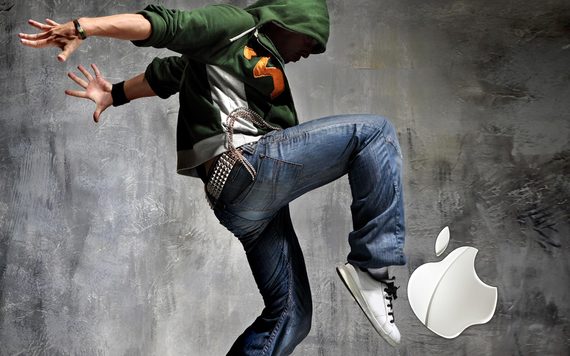Today Apple will unveil its new streaming music service at its annual Worldwide Developers Conference in San Francisco. Most people expect Apple Music to be an Apple-branded continuation of Beats Music, which Apple acquired for $3 billion last year alongside the Beats Electronics headphones and speakers division. With only 300,000 subscribers, Beats Music is small in comparison to Spotify's 4.7 million U.S subscribers. However, Apple will offer its new streaming service to over 800 million iTunes account holders.
Will Apple change the music industry again?
Before I offer my prediction, let's pause for a moment to ask the bigger marketing question: how do markets change anyways? The answer to this question has surprisingly little to do with textbook economics and much more with the world of storytelling.
You may have seen that Apple has created banners that tout this year's WWDC as the "epicenter of change." Everything we see and hear leading up to today's announcement is just so dramatic. That's because Apple knows that markets move through phases of perpetual structural instability, so-called marketplace dramas. These are the moments in a market's history when established structures run into contradictions and new price-value relationships emerge.
Like all good stories, marketplace dramas are not entirely random; they have a structure. They have clear beginnings, middles, and ends -- a dramaturgy, and there are heroes, villains, and fools on the market stage wrestling over existential conflicts. And there are spectators such as consumers and media journalists looking to take sides. As such, marketplace dramas are reasonably predictable - the kind of predictability that allows us to sort of know what will happen in Westside Story or Titanic in the end because, at one point in our lives, we've read or seen Shakespeare's Romeo and Juliet.
So what are the hero's two most important traits: good timing and a powerful cause.
Consider, in this context, another music marketplace drama: the war on music downloading. Act 1: Northeastern University dropout Shawn Fanning introduces Napster, the world's first peer-to-peer platform. Act 2: Napster is shut down by court order but the breach caused by Fanning escalates to a crisis and millions of consumers go rogue on the industry establishment, excessively downloading through next-gen platforms like Kazaa, Limewire, eDonkey, and Gnutella. Act 3: For a while it seems like the genie is out of the bottle. But then things turn sour. The Recording Industry Association of America is beginning to send out cease and desist letters to downloading teenagers across North America.
And in this moment of downloader identity crisis, Apple enters the stage to offer an irresistible dramatic compromise: return to the realm of legality but without mothballing your rebellious music pirate cloaks. Here is a TV commercial from 2004 set to Greenday version of "I Fought the Law." Or in the words of Steve Jobs: "We believe that 80 percent of the people stealing stuff don't want to be, there's just no legal alternative... So we said, 'Let's create a legal alternative to this.' Everybody wins. Music companies win. The artists win. Apple wins. And the user wins, because he gets a better service and doesn't have to be a thief."
So that's how Apple succeed by offering its own take on "freemium" multi-stakeholder win-win circa 2004.
But that was then, this is now. Back to the original question: will Apple change the music market again? Only if they present a better definition of "freemium" as per Steve Job's above quote but what are the chances of that?
Over the years, Apple has built considerable audience credibility, not least owing to Job's deep appreciation for music. In today's drama, however, the hero role is currently played by Spotify and perhaps Pandora. More recently, when considering iTunes Radio, the free U2 album disaster, or Apple's attempts to stop Spotify from streaming free music, Apple has been looking more like a fool. Many of Spotify's 4.7 million U.S subscribers are children of the downloading generation, consumers who have lost the emotional connection with the iTunes universe. That idea of "free" is still very much at this generation's core but Apple has long become a dominant industry player.
Those rebel days are over.

